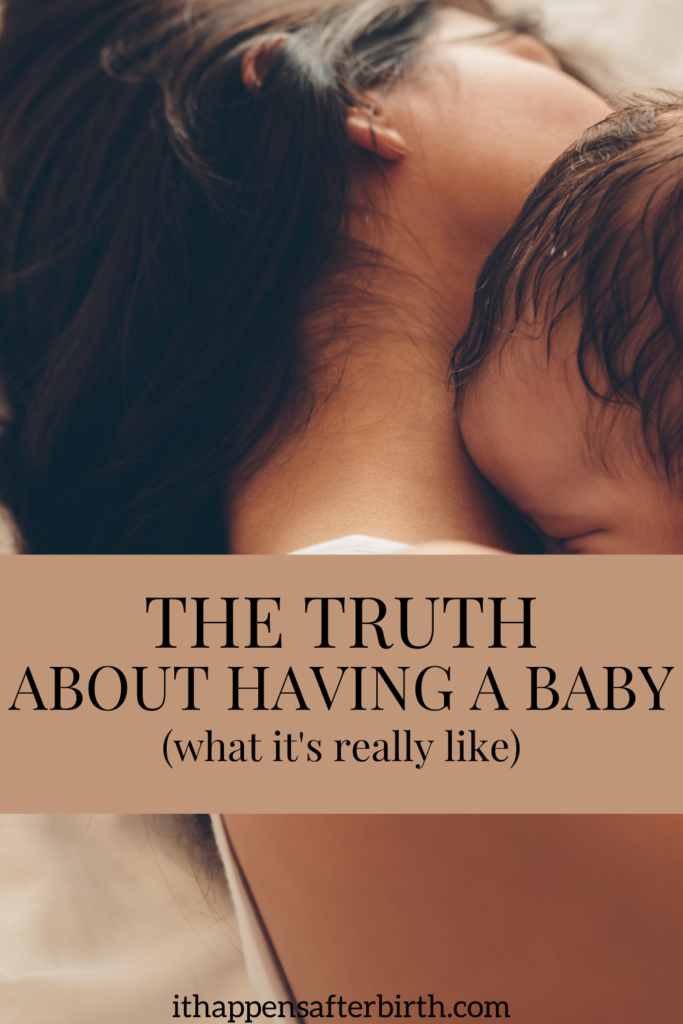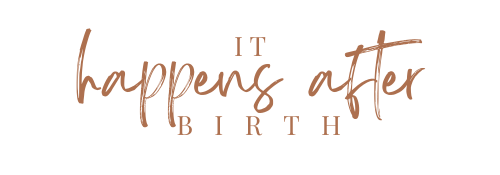
Are you looking to know what it’s really like to have a baby?
Most people will have plenty to say about your birth, or the choices you’ll make when it comes to actually raising your child. On the other hand, the most we often hear about recovery from bringing a child into this world is, “You will never sleep again”.
Yes, it’s true, newborns don’t sleep very well. Yes, it’s true, as a parent you will be tired. But is this the extent of the information we receive on postpartum? That we won‘t sleep? That it will hurt to pee? That we will never have sex again?
All of these things may be true in and of themselves. I’m sure we’ve all experienced it from time to time. But since we have all gone through postpartum, why don’t we spend as much time gently talking to new mothers about what to expect after the baby is born as we do about what to expect out of labor? Why does postpartum seem to be the best-kept motherhood secret that no one knows about until after they have birthed their baby?
I was one of those mothers, prepared for birth, and wanting to be prepared for postpartum. I researched it the same way I researched natural birth techniques- through Pinterest. The myriad of articles I read all boiled down to the same thing: you will need to be gentle with your vaginal area. It will hurt to pee. Take a stool softener because that first bowel movement is SCARY. Eat off paper plates. Accept any offers of food. Breastfeeding can be hard. Postpartum depression is a thing that you might get, no shame if you do, but you probably won’t. Oh, and don’t forget to enjoy this time with your newborn, because they grow up so fast! I went into my postpartum armed with padsicles, freezer meals, and a peri bottle.
And postpartum kicked my butt.
I think that’s what gets left out of so many of these postpartum articles. It’s not that the information they’re giving is wrong or unhelpful. It’s that it’s so… general. Like saying labor hurts. Yes, it does! But there is so much more to it than that. So much to know.
So, what should you know about having a baby? Here’s my attempt at giving an honest picture.
Know that the time after birth hurts.
It may not be labor, but it hurts. Whether your baby came out through your vagina or your abdomen, there is going to be some major healing that needs to go on. At best, you will feel sore and fragile. At worst, you will not be able to move without the kind of pain that requires you to practice the deep breathing you learned before birth. You may not be able to stand or even sit up straight. You will have to finagle yourself into a strange half leaning, half lying, sitting up position. You’ll make it work.
Know that feeding your baby will be hard.
If you are breastfeeding, you are learning a whole new skill, forming a partnership with a brand new tiny human being that is learning right along with you. At best, you will feel lots of soreness when baby latches on during the first few weeks, at least for the first few seconds. At worst, your nipples will crack open and bleed. Then they will scab over in between feedings, only for your baby to rip open the scabs afresh at the next one. You will cry at the thought of feeding your baby, you will cry from the pain of feeding your baby. You will want to quit and you will need all the help you can get.
If you have chosen not to breastfeed, or are not able to breastfeed (it’s rare, but it does happen), you will have to clean and sterilize the bottle parts every night, make up the bottles in the correct way, while ensuring proper water temperature, every two hours, even through the night, when you are dead tired and just want to sleep. At best, you will feel mildly frustrated that formula takes so much effort. At worst, your baby might be sensitive to certain brands/kinds of formula, which will require much trial and error on your part, and you will want to chuck everything against the wall and ask “Why can’t anything ever be simple?” and then bawl your eyes out.
(Note: breastfeeding is not meant to be painful beyond some soreness in the first few weeks; cracked nipples or other forms of pain are a sign that something is not right, possibly with latch or positioning. Look for a lactation consultant, IBCLC, La Leche League, or other knowledgeable persons in your area. Or you can check out my post on latching here.)
Know that you will be tired.
Yes, the warning is true. Babies have a different sleep pattern than adults do, and on top of that, they may have their circadian rhythm mixed up so that your nights are their days, your days are their nights. Your baby has just come from your womb, where the temperature was always right, your heartbeat was always right there, and nutrients came continuously so there was never hunger. That’s a huge adjustment, and they will not be sleeping right away, at least not after the first one or two days. At best, you will feel a bit run down from less sleep than you’re used to. At worst, you will be bone-tired, completely in the fog, willing to do anything to get even three consecutive hours of sleep.
Know that your baby wasn‘t the only one who was born.
While it’s general knowledge that each birth brings a new human out of the womb- your baby- the lesser known fact is that another being is born that same day: You. Birth symbolizes something new, and that includes a new version of yourself. Postpartum is where you meet this new version. Having a baby changes you, almost imperceptibly, until suddenly you look up and see that you’re not the same person you used to be; the landscape of your heart and mind has been altered. This isn’t a bad thing. But it does mean that at the time you have gained something wonderful, you have to say goodbye to what was before. Change has happened. Change always necessitates a form of loss. And both “change” and “loss” are very scary terms. It will take you a while to feel comfortable in your new skin.
Know that you will be emotional.
VERY emotional. You will cry. And you will laugh. You may feel crazy. There will be joy, fear, sadness, happiness, contentment, terror… Perhaps all in the same moment. You will experience a natural low starting the first few days after birth, due to all of your hormone levels restructuring, and you will feel weepy, anxious, or as if you are being too dependent (which you’re not). Believe it or not, this is normal! (Basic feelings of sadness, that is. If the feeling of sadness persists past a couple of weeks, worsens, or is inhibiting your ability to function, you may be developing a postpartum mood disorder such as anxiety or depression, and should mention it to your doctor or midwife as soon as you can.)
I know that most of us imagine being insanely happy, and only happy, after the birth of our baby. But the truth of the matter is that these other feelings come in as well.
Know that your postpartum experience is your own.
It is highly unlikely that your recovery after birth will be a carbon copy of someone else’s. Even your own postpartums, if you have multiple children, are likely to be different from each other. There will probably always be something unique about your postpartum as opposed to the other women you know. There will also probably always be something about your own postpartum that catches you off guard. So DO NOT compare your recovery, your bonding with your baby in the first few weeks or months, your life during postpartum, with somebody else’s. DO be honest with yourself, and others, and encourage other moms to do the same with you.
Know that you will question your parenting.
For a moment, close your eyes and imagine it’s not your baby you are going to be welcoming into your home.
Imagine it’s a child that you have never met before. One whose needs and preferences you don’t know. One who cannot speak, who can only cry when they need something, but since you don’t know them, you don’t know what their cries mean. They can’t sleep through the night. They need companionship at all times, but they still cry even when you’re with them. Suddenly you’re questioning everything that you do, wondering if you’re a good person, if you’re cut out to do this, if you will ever even get to know this person who has suddenly taken residence in your home.
Now take this same criteria, but imagine your precious baby in your arms as the child you’ve never met. THIS is what it’s like to raise your baby in the first few weeks. You may be the best parent in the world, and you are still going to doubt your parenting.
Know that you may not feel deep love right away.
We’ve all heard the stories of the instantaneous, overwhelming love that washes over mothers as soon as their newborn baby is placed in their arms, right? It does indeed happen that way for many mothers, but other times, it doesn’t. That does not mean you don’t care about your baby. It doesn’t mean you don’t know that you love your baby. And it does not mean you are a bad mother.
It also doesn’t mean that feeling of overwhelming love will never happen. Sometimes, these things simply take a bit more time. At best, you will feel that amazing, deeper than deep, in-love feeling for your baby right away. At worst, it will come slowly over the weeks, as you care for and get to know your baby better. Again, this doesn’t mean that you don’t have the knowledge of love for your baby from the start. It is there. It just takes longer to blossom.
Know that you won‘t know.
You may have noticed that for some of these paragraphs, I’ve been putting a scale of “at best” and “at worst”. Why is that? Because there is no way to predict which way your postpartum will go, or how you will feel on a certain issue, or whether something will even be a non-issue for you. Trying to predict what your postpartum will look like is equivalent to trying to predict how your birth will go. It doesn’t mean you can’t know about the issues that surround birth, know what you want, prepare and strive for what you want, and know your options if things don’t go the way you hoped. The same goes for postpartum.
Know that you are not alone.
There is a high chance that if you experience some aspect of difficulty recovering from birth, you are going to feel like the first mother in the world to go through that… And as if that somehow makes you a bad mother (it DOES NOT). Want to know the truth? When I look around at mothers having babies, I see everyone putting their absolute best foot forward. We are all trying to live up to the standard that we think we should be at. We are all experiencing so much more than we let on to everybody else. And we are all right here in this with you.
And lastly…
Know that it is not as bad as it sounds.
But at the same time, it is. Confusing, right? I had a hard time writing this because the entire time I was imagining a poor mom-to-be reading it and deciding that having a baby is the worst thing ever. It’s not. There is so much good mixed in with the difficult; so much worth in having a baby, even when it’s hard at first.
What I want is to give mothers an accurate snapshot of what it’s like to recover from childbirth and adjust to having a baby. Because so many of us are under the impression that physical healing is all we have to deal with, and everything else will be sunshine and rainbows. (And let me tell you, I suspect that many new mothers are underestimating what the “physical healing” part is like too.) Having that illusion shattered after birth, when you are not prepared, when you don’t know where to turn, is not only hard, it’s scary. To have a baby isn’t something done lightly. Having a baby is like marriage, like achieving a dream, like changing things for the better, like anything in life that is worth anything- VERY HARD. But so very, very worth it.

